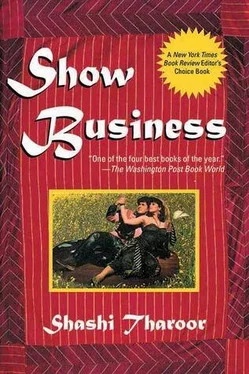Did that ever stop you? Not really. Well, yes, for a bit. But a man has his needs, you know, and God knows I have the opportunities. Everyone seems to want to bed an actor. You should see some of the fan mail Subramanyam has to process every day. Traditional housewives in Jabalpur write to describe in loving detail what they’d like me to do to them. We just send them a printed postcard in reply, but Subramanyam shows me some of the more extraordinary propositions. And that’s long distance. Here in Bombay, it’s actually worse. Or better, depending on your point of view. It’s always more difficult to turn the girls away than to simply enjoy what comes my way. I mean, come on, no one takes it seriously.
What about Maya? Well, yes, I suppose she’d take it seriously, if she found out. So a certain amount of discretion has been necessary. I’m not sure how effective it’s been, though. This industry’s full of rumors. Word gets around.
Why don’t you tell her, directly? Ah, well, yes. But no, not really. I couldn’t do that.
Why not? I couldn’t. She has a fiery temper, you know, which I never suspected existed. Shows you how premarital appearances can be deceptive. She would erupt. She might just walk out, leave me.
So what? What do you mean, so what? It was the marriage of the decade, for God’s sake. Not just in the film press — we made the front page of the Times of India. And I don’t want to give her up. It’s not as if I want to marry any of these girls, for Christ’s sake. My marriage to Maya is important to me. If it ends in disgrace, it’ll destroy me.
Nonsense. The public doesn’t care all that much. Look, being Maya’s husband is part of my image now. People see me not just as Ashok Banjara, but as the guy Maya saw enough in to marry and give up her career for. To go from that to being the guy Maya walked out on — it would finish me, really. And what about my father? He’s grudgingly accepted my profession, now that it’s made me more famous than he is. But one of the first things he said to me about it was, “Son, you’re now a public man. And a public man has public responsibilities. Make sure you live up to yours.” How do you think he’ll react to having his son the centerpiece of a scandalous divorce? Forget it. The costs are too high.
So you’re scared. Perhaps, but it’s not just that. Where else would I find a wife like Maya? She’s ideal, man, the nation’s ideal bahu. Half these women I take to the bedroom I wouldn’t be caught dead with in a living room. Maya’s all right. I just wish she’d ease up a bit, stop complaining so much, be a bit more fun to be with.
And let you sleep with other women. (Silence.)
Well? I have nothing more to say. This off-the-record interview is over.
Naw. It’s much easier to deal with Woman’s World. “I was saying all these romantic things to Maya on screen when I realized I meant every word of the dialogue,” I say to the interviewer joshingly, “and which Hindi film actor can afford that? So I had to marry her, before someone changed the script.”
The woman journalist laughs. When I see her to the door she presses a piece of paper into my hand. After she has left, I see that it contains her private phone number and two words: “any time.”
For a long moment I look at it, recalling the woman’s skimpy low-cut blouse and readiness to laugh. I push the piece of paper into a pocket. Perhaps some time.
Cyrus Sponerwalla bursts in while I’m with Subramanyam. His three chins are flapping about as excitedly as the magazine in his hand.
“Listen to this,” he declaims.
Darlings, Cheetah is so impressed by Ashok Banjara these days. All of you pets know that I haven’t always thought very highly of our tall-fair-and-handsome hero. But in his recent films the Hungry Young Man has really polished up his moves. In Love in Paris he really brought a certain je ne sais quoi to the hackneyed role of the Indian lover abroad. And reliable sources whisper in my ear that he has a highly developed taste in champagne, Cheetah s favorite drink. No wonder the industry is bubbly over him, eh? Grrrowl …
He looks up, breathless from reading. “So how about that, hanh? Should do you some good, faith-wise.”
“Sure, Cyrus,” I grin. “Faith fully restored. Only, next time there’s a bottle to be presented to the lady in question, you go. OK?” He turns to leave. “And Cyrus …”
“Yes?”
“Before you do, get some exercise, OK? You’re in no sort of shape for scientific inquiry.”
Exterior: Day/Night
JUDAI
(The Bond)
“What!” The villains face rises to fill the screen as his voice resounds through the hall.
“Yes, Thakur. It is written in the stars and in the palm leaves handed down for generations that foretell your family’s destiny. Your sister’s son will bring about your downfall.”
“Never!” screams Pranay, a short, angry figure in jodhpurs and black boots, a riding crop in his stubby hand. “This shall not come to pass!” He flicks his whip at the pandit who has brought him the news, scattering the learned man’s papers. The Brahmin bends in dismay to pick them up as the feudal Thakur strides purposefully down the immense chandeliered hall, his footsteps echoing on the marble floor.
In a bedroom of considerably less elegance, the Thakur’s sister, Abha, in the throes of childbirth, heaves and moans. Her blanket is modestly drawn up to her neck, but a few beads of sweat stand on her forehead like the pearls she has been used to wearing in her earlier films. A kindly midwife, Amma, murmurs encouraging words of solicitude. Soon a cry is heard, a baby’s response to the world he has just entered. Amma smiles beatifically.
But something is wrong — Abha is still in pain! Amma’s saintly brow creases in puzzlement and worry. Abha moans again, gasps. Her body arches under the blanket. “What is happening, beti?” Amma asks anxiously. The answer comes soon, but not from Abha’s lips. A second wail is heard, louder than the first; the two wails form an unmusical duet.
“Twins!” exclaims Amma. “Abha, you’ve become a mother of twin boys!”
Abha smiles exhaustedly. Two babies, miraculously clean and umbilicus-less, are placed on her pillow on either side of her. She turns her head from side to side. The babies (somewhat too large to be convincing, but then where can you get newborns to be Junior Artistes?) gurgle happily.
Outside the bedroom Amma summons a family retainer, Raju, a thin man in a khaki shirt, a brown Nehru cap, and a dustcloth draped over one shoulder. “Abhaji has had twin sons. Go and give the Thakur-sahib the good news.” Raju brings raised palms together in an obedient namaste.
“Wonderful,” says the Thakur insincerely as Raju, hands still folded in supplication, conveys the glad tidings to him in his chandeliered hall. “We shall distribute sweets in the village. Tell my sister I shall come and see my new nephews tomorrow.” Raju nods, does namaste, and is dismissed.
He has not gone far, however, when he hears the Thakur summon his sidekick, Kalia, an immense black bald-headed man instantly identified by the audience as a villainous sidekick from scores of other films. Raju stands near a convenient window and listens.
“Kalia,” Pranay announces, twirling his evil mustache, “the astrologers have forecast my downfall at the hands of my sister’s son. I don’t know which one of these two is destined to oppose me, but the only way to be safe is to kill them both. See that it is done, Kalia — tonight.”
The swell of background music paints an aural exclamation mark on Raju’s horrified forehead. He gasps in shock, then sets out at a fast clip for Abha’s home.
Читать дальше












